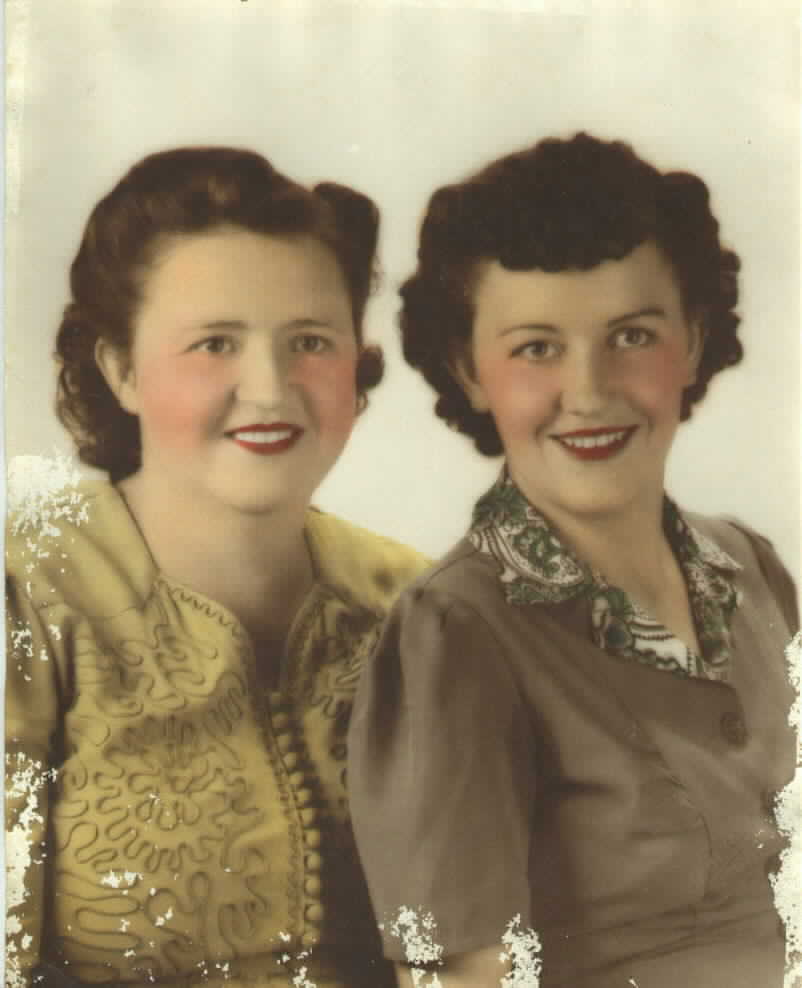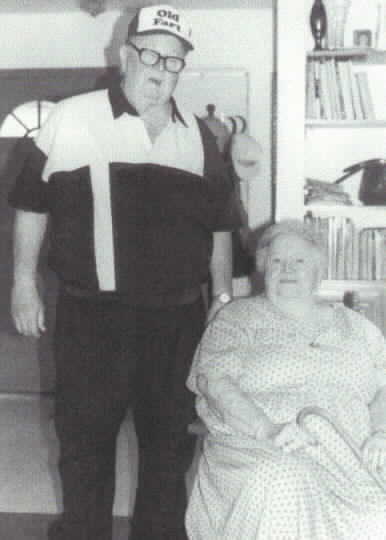Mildred Bernhardt (nee Ross)


 Mildred Bernhardt, my great, great aunt, was born in Cushion, Oklahoma on October 16, 1917 . She
is the daughter of Teffy Lee Ellis and James Ross. She grew up living in Dallas, Texas for a
few years and then moved to
San Antonio, Texas, where she still resides. She was the second
born of four children. She has two brothers and one sister. Her two brothers
both served in the war. Her brother Robert was stationed in England as a Chief
Warrant Officer. Her brother Bill was stationed in Guadalcanal. He served as a
plane mechanic. Each of her brothers were seventeen years old when they joined
the service. One brother received seventeen dollars and the other twenty-one dollars
per month. These funds were used for their spending money. After the war was over
neither cared to talk of any aspects of the war. Before ever enrolling
in the service they each worked for a Tree Army Camp. Here they would build fences. The money
received for their work was sent home to help out the family.
Mildred Bernhardt, my great, great aunt, was born in Cushion, Oklahoma on October 16, 1917 . She
is the daughter of Teffy Lee Ellis and James Ross. She grew up living in Dallas, Texas for a
few years and then moved to
San Antonio, Texas, where she still resides. She was the second
born of four children. She has two brothers and one sister. Her two brothers
both served in the war. Her brother Robert was stationed in England as a Chief
Warrant Officer. Her brother Bill was stationed in Guadalcanal. He served as a
plane mechanic. Each of her brothers were seventeen years old when they joined
the service. One brother received seventeen dollars and the other twenty-one dollars
per month. These funds were used for their spending money. After the war was over
neither cared to talk of any aspects of the war. Before ever enrolling
in the service they each worked for a Tree Army Camp. Here they would build fences. The money
received for their work was sent home to help out the family. During the time of World War II, Mildred Bernhardt was already twenty-four years old. In 1941 her first child, James, was born. Now being a mother she stayed at home and took care of this newborn. As years passed, her daughter Billie and second son Samuel were born. It was not until after World War II that she ever held a paying job. Her husband, Frank Bernhardt, was a farmer. Frank Bernhardt never served in World War II because he was already forty-one years of age when the United States entered the war. At this time he was thought of as being too old. Today she is now eighty-five years old and still residing on the family farm. She has been a resident on the family farm for the past sixty-seven years. She has no intentions of leaving anytime soon. I recall in my childhood, her already being in her seventies, starting her own resturant called Granny's Cafe which had a washateria connected to it in Elmendorf, Texas. After running this resturant for a few years she sold it for it was becoming too much for her to handle. Mildred Bernhardt has always been a very loved person by all who meet her. To all who meet her she is always referred to as Granny.
Was your husband in the war? If not, why?
My husband was not in the war because he was too old. (later on in the
interview we calculated his age) At the time when the United States entered
the war he was already forty-one years old. He kept to farming.
What was your husband's occupation?
(she stated again) He was a farmer and that's what we survived on. (thinking...
remembering) He also worked for W.S. Dicki at Saspemco Boiler Farming. (confused
about what he actually did here and her daughter's help) Here is where they made
tile or pipe. (later on in the interview) She recalled that they used to sell eggs
at the market.
What were your living conditions during this time?(Did you own your own home and
land?)
They were about normal. The war didn't really have any kind of effect on us.
Frank's parents owned the land and home where we lived.
Did you have to sell any of your land to survive on during this time?
We didn't have to sell any of our land to be able to survive. The family owned
over one-hundred acres of land. (stating at the end of the interview) I have lived here
for almost seventy years now. We moved here in 1935 and have never left.
What kind of income did you rely on during World War II?
(restating) We survived off of our farm and Frank working at the boiler farmer.
He made twenty dollars a week here. We would save a bond each month from the money
he received working at the boiler farmer. We would put eighteen dollars into a bond
each month. It took ten years for this bond to mature.
Did the women have to work during this time?
The women just continued to do their housework and make quilts.
Was it easy to find jobs during this time?
(laughing) I never had to look for one. I would make quilts and sew. I would
sew for people and receive twenty-five cents per dress.
Was it easy to buy food? Did you grow your own food?
We had a garden and grew corn. Certain members of the family would get together
and we would put up canned goods. We would also share food grown in our gardens.
We never ran out of stamps. It was different for country people than the city people.
We didn't have all the expenses of the city or the goods to buy. This was partly
because we had the ability of growing our own food.
Was it common for a family to own a car during this time? What kind of impact
did the war have on gasoline prices?
(laughing,thinking of her fond memories seeing her husband driving his car) Frank bought
him a car called a
Whippet (she couldn't recall the year model though). He would drive six miles to
W.S. Dicki each day. At this time it was only seventeen miles to drive to downtown
San Antonio. Today it is about a twenty-five mile drive. (my reaction) It is amazing
how much roadways have changed in San Antonio since the early to mid-1900s.
Up to what grade level did you go to school?
Frank and I both attended school up until the tenth grade.
Do you think that life would have been different for you and your family had there
been a war or not?
(as previously stated) There was no difference except for rations and it didn't hurt
us. We would receive Relief Sac once a month. It looked like a tote sac filled with
food items. These were handed out once a month.
Whippet
"Restored-Classics-The Brisbane Vintage Auto Club Inc."
A 1926 Whippet 96 Roadster. This will provide you the idea of what a Whippet looked like. Before this
interview I had never heard of such a car.
Elmendorf, Texas
Long, Christopher. The Handbook of Texas Online.
Last Updated: July 23, 2001
The small town of Elmendorf, Texas. Elmendorf is located on the southeast side of San Antonio in Bexar County. The town
was established in 1885 and named for Henry Elmendorf, former mayor of San Antonio
and promoter of the first brick plant in the vicinity.
Tree Army Camp
Cohen, Stan. "The CCC in Idaho." Idaho Public Television.
These camps were established for the purpose of performing emergency
conservation work and helped to preserve the nation's heritage. Thousands of unemployed
young men were employed under the Civilian Conservation Corps
(C.C.C.) during the Great Depression.